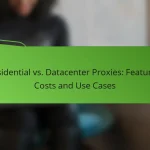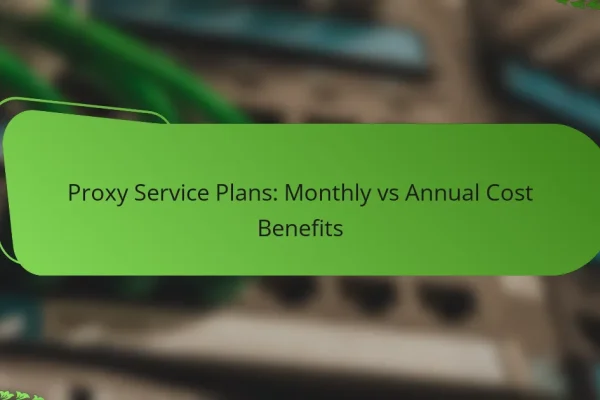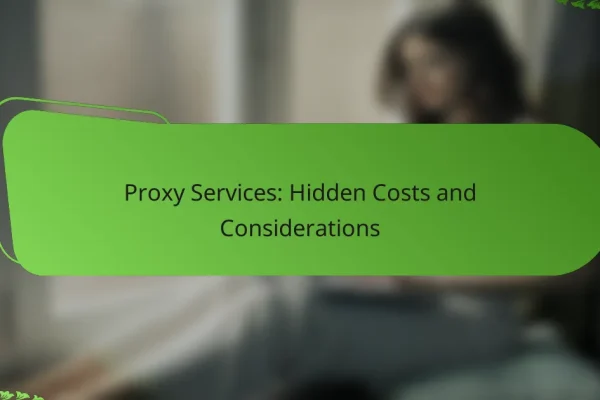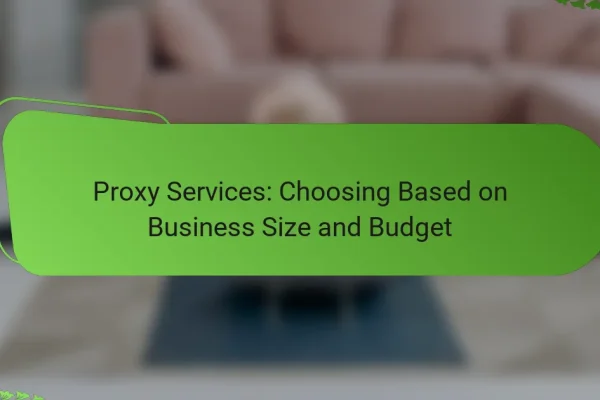What are the costs associated with proxy services in the US?
The costs associated with proxy services in the US can vary significantly based on the provider and the type of service chosen. Users typically encounter monthly subscription fees, pay-as-you-go pricing, setup costs, data usage fees, and potential overage charges.
Monthly subscription fees
Monthly subscription fees for proxy services can range from around $10 to over $100, depending on the features and bandwidth offered. Basic plans usually provide access to shared proxies, while premium plans may include dedicated proxies with higher speeds and better security.
When selecting a plan, consider the number of proxies you need and the level of customer support provided. Some providers offer discounts for annual subscriptions, which can help save costs in the long run.
Pay-as-you-go pricing
Pay-as-you-go pricing allows users to pay only for the proxy services they actually use, making it a flexible option. Rates typically range from a few cents to a few dollars per gigabyte of data transferred.
This model is ideal for businesses with fluctuating needs or those testing the service before committing to a subscription. However, it can become expensive if usage is high, so monitoring data consumption is crucial.
Setup and installation costs
Setup and installation costs for proxy services can vary, with some providers offering free setup while others may charge a one-time fee ranging from $10 to $50. This fee often covers initial configuration and support during the onboarding process.
It’s essential to check if the provider includes setup assistance in their pricing, as this can save time and ensure proper configuration for optimal performance.
Data usage fees
Data usage fees are charged based on the amount of data transferred through the proxy. Many providers include a certain amount of data in their monthly fees, but excess usage can incur additional charges, typically ranging from $0.10 to $1.00 per GB.
Understanding your data needs and selecting a plan that accommodates them can help avoid unexpected costs. Always review the provider’s data limits and fees before signing up.
Overage charges
Overage charges apply when users exceed their data limits or usage caps. These fees can vary widely, often ranging from $1 to $10 per additional GB, depending on the provider’s policies.
To prevent overage charges, consider choosing a plan with a higher data limit or monitoring your usage closely. Some providers offer notifications when approaching limits, which can help manage costs effectively.
How do different proxy types affect pricing?
The pricing of proxy services varies significantly based on the type of proxy used. Residential, datacenter, and mobile proxies each have distinct cost structures influenced by factors like availability, demand, and the level of anonymity they provide.
Residential proxies pricing
Residential proxies are typically the most expensive option due to their high level of anonymity and reliability. Prices can range from $10 to $100 per month for a single IP, depending on the provider and the number of IPs purchased. Bulk purchases often come with discounts, making it more economical for businesses needing multiple connections.
When selecting residential proxies, consider the geographic diversity of IPs available, as this can impact performance for specific tasks like web scraping or ad verification. Providers that offer a wide range of locations may charge a premium but can enhance your overall effectiveness.
Datacenter proxies pricing
Datacenter proxies are generally more affordable, with prices often between $1 to $10 per month per IP. These proxies are hosted in data centers and do not provide the same level of anonymity as residential proxies, making them suitable for less sensitive tasks. However, they can be easily detected by websites that employ anti-bot measures.
For users looking to save costs, datacenter proxies are a good choice for tasks like automated testing or accessing geo-restricted content. Be cautious of the potential for IP bans, especially if you are scraping data from heavily monitored sites.
Mobile proxies pricing
Mobile proxies usually fall in the mid to high price range, typically costing between $10 to $50 per month per IP. These proxies use mobile IP addresses, which makes them less likely to be flagged by websites compared to datacenter proxies. This feature is particularly useful for tasks that require high anonymity, such as social media management or ad verification.
When choosing mobile proxies, consider the data plan limits and the number of simultaneous connections allowed. Some providers offer flexible plans that can accommodate varying usage levels, which can help manage costs effectively.
What factors influence the cost of proxy services?
The cost of proxy services is influenced by several key factors, including bandwidth requirements, geographic location, service level agreements, and the number of IP addresses needed. Understanding these elements can help you make informed decisions and optimize your proxy service expenditure.
Bandwidth requirements
Bandwidth requirements play a crucial role in determining the cost of proxy services. Higher bandwidth typically leads to increased costs, as providers charge more for the ability to handle larger volumes of data. For example, if your operations require streaming or large file transfers, you may need a plan that supports higher bandwidth, which can significantly affect pricing.
When assessing bandwidth needs, consider your usage patterns. If your activities are sporadic, a lower bandwidth plan might suffice, while consistent high-demand usage will necessitate a more robust solution. Always evaluate whether the cost aligns with your actual usage to avoid overpaying.
Geographic location
The geographic location of proxy servers can impact costs due to varying operational expenses and demand in different regions. For instance, proxies located in high-demand areas, such as North America or Western Europe, may be priced higher than those in less populated regions. This is due to factors like infrastructure costs and market competition.
Additionally, consider the legal and regulatory environment of the region where the proxy servers are located. Certain countries may have stricter regulations that can influence service availability and pricing. Always ensure that the chosen location aligns with your operational needs and compliance requirements.
Service level agreements
Service level agreements (SLAs) define the quality and reliability of the proxy service, which can significantly affect pricing. Higher-tier SLAs often guarantee better uptime, faster response times, and dedicated support, all of which come at a premium. Assess your needs carefully to determine if a basic SLA suffices or if you require enhanced service guarantees.
When comparing SLAs, look for key performance indicators such as uptime percentages and support response times. A well-defined SLA can save costs in the long run by minimizing downtime and ensuring that your operations run smoothly.
Number of IP addresses
The number of IP addresses you require directly influences the cost of proxy services. Many providers offer tiered pricing based on the number of IPs, with discounts often available for bulk purchases. If your operations involve multiple users or require diverse geographic IPs, factor this into your budget.
Consider your actual needs versus potential future growth. It may be more cost-effective to purchase a larger block of IP addresses upfront if you anticipate needing more in the near future. However, avoid overcommitting to unnecessary IPs, as this can lead to wasted resources and increased costs.
How to choose a cost-effective proxy service?
To choose a cost-effective proxy service, focus on balancing price with performance and features. Assess your specific needs, such as the type of proxies required and the volume of usage, to find a service that offers the best value for your budget.
Compare pricing plans
When comparing pricing plans, look for services that offer tiered pricing based on usage levels. Many providers have monthly subscriptions, pay-as-you-go options, or annual discounts. For instance, basic plans may start at around $10 to $50 per month, while more advanced options can range from $100 to several hundred dollars depending on features.
Consider what is included in each plan, such as the number of IP addresses, bandwidth limits, and access to premium features. A lower price might seem attractive, but ensure it meets your operational requirements.
Evaluate performance metrics
Performance metrics are crucial in determining the effectiveness of a proxy service. Key metrics to evaluate include connection speed, uptime reliability, and latency. Look for services that provide at least 99% uptime and low latency, ideally in the low tens of milliseconds for optimal performance.
Read user reviews and conduct tests if possible to gauge real-world performance. A service that consistently delivers fast and reliable connections can save you time and enhance your productivity.
Check for hidden fees
Hidden fees can significantly increase the total cost of a proxy service. Be sure to read the fine print regarding setup fees, overage charges, and cancellation policies. Some providers may charge additional fees for exceeding bandwidth limits or accessing certain features.
Ask potential providers about any extra costs upfront to avoid surprises later. A transparent pricing structure is a good indicator of a trustworthy service.
What are the benefits of investing in premium proxy services?
Investing in premium proxy services offers enhanced privacy, security, and performance for internet users. These services can significantly improve online activities, such as web scraping, data collection, and accessing geo-restricted content.
Improved security features
Premium proxy services provide advanced security features that protect users from various online threats. They often include encryption protocols, which safeguard data transmission and prevent unauthorized access.
Additionally, many premium proxies offer features like IP rotation and anonymity, making it harder for websites to track user behavior. This is particularly beneficial for businesses that need to maintain confidentiality while conducting market research or competitive analysis.
Higher reliability and uptime
Investing in premium proxy services typically results in higher reliability and uptime compared to free alternatives. These services often guarantee 99.9% uptime, ensuring that users can access the internet without interruptions.
Moreover, premium providers usually have a robust infrastructure with multiple servers located worldwide. This setup allows for better load balancing and faster connection speeds, which is crucial for tasks that require consistent performance, such as streaming or bulk data scraping.












